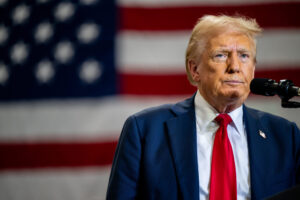20:28
News Story
Andrew Bailey defeats Will Scharf to capture GOP nomination for attorney general
COLUMBIA — Missouri Attorney General Andrew Bailey survived a tough primary challenge from a member of former president Donald Trump’s legal team on Tuesday to win the GOP nomination for a full term in office.
His opponent, Will Scharf, conceded the race shortly before 8:30 p.m. with Bailey leading 62% to 37%. Bailey soon addressed a crowd of supporters at the Stoney Creek Hotel in Columbia.
Taking the stage with his young son in one arm, Bailey raised his fist and deepened his voice.
“Tomorrow, when reveille sounds,” Bailey said, speaking about himself in third person, “Andrew Bailey will grab his rucksack and his rifle and will stand in formation with other conservative leaders as we march on to victory in November.”
Bailey has held the office since November 2022, when he was appointed attorney general by Gov. Mike Parson after his predecessor Eric Schmitt won a U.S. Senate seat. At the time Bailey was Parson’s general counsel and had no experience in elected office.
An Army veteran and former assistant prosecutor, Bailey has said much of his career has been shaped by his time as an assistant prosecutor and county juvenile office in Missouri. He and his wife went on to foster and then adopt three of their four children.
“I am committed to serving the people of this state and delivering transformative, conservative change,” he told a cheering crowd Tuesday.
Bailey promised to continue fighting the Biden administration and strengthening consumer protection.
His most high-profile cases since becoming attorney general include twice suing to block federal student loan forgiveness, and carrying forward a lawsuit alleging the Biden administration was censoring conservatives online by pressuring social media companies.
Bailey has also touted awarding $32 million in settlements and judgments on behalf of defrauded Missourians through his office’s Consumer Protection Division.
Dorothy Berry, 71, said she was upset when Parson appointed Bailey instead of former state Sen. Kurt Schaefer, whom she favored. Berry kept a close eye on Bailey, ready to make a list of his mistakes. But at the end of the day, she said she couldn’t find any to write home about.
She said she agreed with Bailey’s role in the closure of Washington University Transgender Center at St. Louis Children’s Hospital and his push to drive former St. Louis Circuit Attorney Kim Gardner out of office.
Berry, who spent more than two decades working for Missouri lawmakers, said she also liked that Bailey spent much of his childhood in Missouri.
“He graduated from Rock Bridge High School,” Berry said. “He’s not some St. Louis or Kansas City millionaire.”
Bailey on the campaign trail often rebuked Scharf as “Wall Street Willie.” Scharf, who grew up in New York and graduated from Princeton University and Harvard Law School, moved to Missouri in 2011.
Meanwhile, PACs backing Scharf spent millions attacking Bailey’s record. Scharf’s campaign committee and associated PAC raised $9 million in the campaign, including from influential conservative activist Leonard Leo. Bailey raised $4.1 million.
Bailey has faced accusations of corruption, incompetence and grandstanding, with his critics alleging he’s more interested in scoring appearances on Fox News than effectively running the sprawling office or winning in the courtroom.
Bailey recused himself from a gambling lawsuit filed against the Missouri State Highway Patrol after PACs connected to the lobbyist of the companies suing the state wrote checks to the committee supporting Bailey’s campaign.
He was also criticized for accepting $50,000 in campaign donations from Doe Run, a St. Louis-based company being sued by thousands of Peruvians over allegations of lead smelter poisoning in their mining town in the Andes. A few months before the donation, Bailey filed a brief asking the federal court to move the lawsuit out of Missouri.
Just this week, the U.S. Supreme Court rejected Bailey’s attempts to delay the sentencing hearing in Trump’s hush money case in New York, which is scheduled for September.
Julie Engelbrecht, a Scharf supporter from Ladue who attended his watch party, said she believes Scharf’s legal successes are “lengths ahead” of Bailey’s, noting several cases Bailey lost, and several attorneys who’ve left his office.
But in the end, Bailey benefited from a late endorsement of both candidates by Trump, taking away one of Scharf’s most potent campaign messages — his close ties to the former president.
Bailey also enjoyed late support from Parson, who even used his official office to boost the attorney general in the campaign’s final days.
Early Tuesday evening, Scharf told The Independent he was hoping for a long night, meaning a close race.
That didn’t come to fruition. An hour into vote counting, his corner of campaign staff looked concerned, hunching over laptops in a corner of Krueger’s bar in Clayton.
Scharf during a concession speech a short time later said he called Bailey to concede and offer his full support in the general election.
“I’m not going anywhere,” Scharf said Tuesday night. “I intend to continue chalking up wins for President Trump and for the conservative movement in the months and years ahead. I’m just deeply sorry that I won’t be doing that as the state’s next attorney general.”
Bailey later tipped his hat to Scharf’s tough-fought campaign.
“This is someone who’s worked for President Trump in the past, and he pledged his support in the future,” he said, “and I’m excited to look for ways to partner in the future to move the state in a good direction.”
Bailey will face Democratic candidate Elad Gross in the November general election. Gross, a former assistant attorney general who runs a St. Louis law firm, has been an outspoken champion of Sunshine law and, like Scharf, a fierce critic of Bailey.
Bailey’s speech was brief, ending when his son polished off his cookie.
“That’s my signal,” Bailey said, “to cease and desist.”
Our stories may be republished online or in print under Creative Commons license CC BY-NC-ND 4.0. We ask that you edit only for style or to shorten, provide proper attribution and link to our website. AP and Getty images may not be republished. Please see our republishing guidelines for use of any other photos and graphics.





